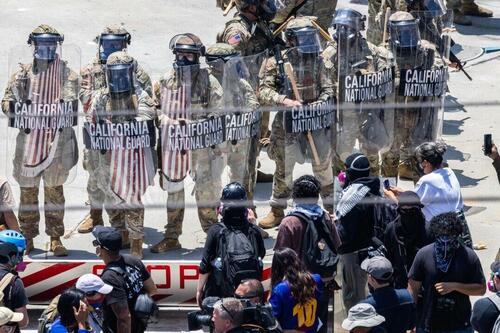(0:00 - 0:28)
The world that is presented to us is a carefully constructed fantasy. Almost everything we are told, almost everything that the majority of people believe, serves only the purpose of controlling those same people. The rich and the powerful construct this fantasy so that the people they govern will comply of their own volition, because they don't have sufficient jackboots to point guns at all of our heads and force our compliance.
(0:28 - 1:51)
But the truth can be found, if you ask the right people, or look in the right places. For example, you may believe, as I did, that the Internet was first created by a group of scientists at MIT. It wasn't.
MIT scientists did come up with the idea. But the Internet's inception happened in 1969, when the U.S. military created ARPANET. It was made free and public in 1995 by Bill Gates.
But not for your benefit. You also likely believe that cryptocurrencies, or at least most of them, can't be monitored by governments. As you will discover in this interview, that is also not true.
Financial experts Adrian Spitters and Peter Merrick, best-selling authors of It Starts With Gold, recently published a paper which shows how the Internet, the financial sector, and cryptocurrencies are all part of the globalist plan to monitor and control us all. Furthermore, there's strong evidence that CBDCs themselves may be a psy-op to push you into cryptocurrencies, believing that they can't control those. But they can, and the structure to do so is already in place.
(2:00 - 3:23)
Adrian, Peter, welcome back to the show. Thank you. Now, you contacted me, Adrian and Peter, because, as you guys do, you've done a lot of research into finance and how things are working, as you're working very hard to help people protect themselves against what's coming.
And you have found some very interesting and disturbing information about cryptocurrency. So I'm going to ask you, just to talk about that, give us a general outline. Well, well, I wish we are wrong.
We've never wanted to be more wrong. And if our assumptions that we're building on, which we have documented in a 49-page paper, that if anyone looks at the QR code, they can actually download it. It's on both Adrian and mine.
We started looking at crypto in our last book, It Starts With Gold. And we found some disturbing questions that couldn't be answered regarding it. And everything about crypto and the internet and everything that happens online, we can directly tie back to either the US military or the CIA or to the NSA.
(3:24 - 4:47)
And it all goes back towards that. And I just want to share something for your audience, because they might say crypto is the great off-ramp. Nothing is allowed to exist in society unless it is allowed.
Now, so far, anywhere from $3 trillion to $5 trillion have gone into cryptos. And everything about crypto is built on a US technical infrastructure. And that's what we're going to talk about with you and share with you.
And we believe that it's a huge trap, because at the same time, while over a billion people have dabbled in crypto and it's become really popular amongst people who know that there's something wrong with the US dollar, the central banks and the governments of this world have been suppressing gold as they purchase record amounts. And we wrote a paper that we're talking about on a program tonight, which is called The Last Asset Standing, where we're laying out the fact that they're planning to do a reset on the currency, because we've talked about fiat currency before, and they're going to link it to gold, not crypto. Okay.
(4:48 - 10:20)
Adrian, do you have anything to add to that? He pretty well covered it, so we'll move on. Okay. So now, just before the interview, gentlemen, we were talking about this, and you've uncovered a timeline that raises some very serious concerns about cryptocurrency.
So let's walk through that timeline, please. Well, can we just go and give a prism to look at this first? Because there's two prisms that we're using as we look through this. One is a Hegelian dialectic.
And for those who are not familiar with Hegel, he was a 17th century philosopher, and he came out with something to look at how things are positioned and how people are just hoodwinked. And it happens to be a three-step process that's called problem, reaction, solution. So someone who wants to manipulate society or manipulate you, they have a solution, a certain act they want you to take, a certain path they need you to go.
So what they do is they think of a problem and they get you reacting. And then people start yelling for a solution. They react to it.
And the pre-packaged solution is presented. It just drops in. And that is how I want your viewers to actually look at what we're going to share through that problem, reaction, solution, and constantly look at through that prism, because I think that's going to allow them to understand how we came to our understanding.
And it's not that we think we're right. We're hoping to be proven wrong. And the other prism we'd like your listeners to look at is something called operation trust.
Adrian, can you share what that is? It's some background to the audience. Yeah. This is something that I've been referring to in a number of my articles for the past year.
And I believe we did touch upon it in the book. It starts with gold. And that is the crowd that is currently running Davos are the ancestors, I guess you want to call the descendants.
Descendants is the right word of the people who were responsible for operation trust. During the Bolshevik revolution, there was the Soviet Union counterintelligence operations that was run by the Cheka. And what they did with operation trust was their version of creating something called their version of the freedom movement, where they were identifying anybody that was resisting the takeover.
And they would infiltrate the groups. And then eventually they slaughtered. So operation trust really was infiltrating the opposition and getting them comfortable with what they're doing and then jailing them and or executing them.
I like that well, regarding operation trust, it was Lenin who created it. And it ended up being taken over what became the KGB. And what it was, it's by those of you who've ever read in 1984, there was Goldstein, he ran the resistance and was actually big brother who had actually created it.
And this is something that we're looking at as crypto and a lot of things that have happened in society that we've all experienced, that this is created to actually find those people who have a problem and to direct them in a certain way. So the solution that the power is to be, and the power is to be, we've identified going to the Bank of International Settlements and going to the central bankers, because in past conversations that we've had with UL, and they've been really good ones, we pointed out that the system's about to fall apart. And one of the premises that we've looked at is if you've got unruly animals, you want to actually go and thin the herd and you want to get them under control before it all falls apart.
And you need to distract them before you're going to do a major, major change and get them under control. So, Will, we're ready to go into the timeline whenever you're ready. Absolutely.
Go ahead, Adrian. I just want to add that basically we are experiencing today operation trust through controlled opposition. There are many different groups, a lot of disagreeing groups within our movement now, and we're at a point where it's very hard to trust who's really legit and who is controlled by the government and giving the appearance that they're out there standing up for us.
So we all have to be very, very skeptical about who you align yourself with and do a lot of research and come to a conclusion that the only way to question everything and trust nothing. Right. Absolutely.
All right, gentlemen, the timeline. Well, starting in 1969, there was the creation of ARPANET. I'm not going to go and share what it stands for, but this is the precursor to the internet that was introduced by the U.S. military to if communications went down in the U.S., you would have decentralized communications that if one node went down, you would have other ones being able to get the information.
(10:21 - 11:32)
Now, this was perfected up until 1995 when it was opened up to the rest of us and that many of us who aren't so young will remember when Microsoft introduced Explorer on its Windows 95. It was a big launch. I remember being in Toronto.
They had a big Windows 95 up the CN Tower. It was like this was a big announcement. And one of the questions that Adrian and I asked if this was a military communications, why would it be opened up? And it had been perfected.
It had started to be opened up in 95 only for research departments, military research departments in select universities. And they opened it up to everybody in 95. Now, you have to remember, and this is arguments I heard about the internet, especially when they started censoring us because all of us, you well included, have been put in the bad boys corner, right? Because we say truths that are not popular.
(11:35 - 14:25)
If it wasn't free, and I mean by free, of course, it costs money for internet and dial-up. We all remember AOL and hearing that noise as it connected, not for the young people. They don't remember those days.
If it wasn't free, all of us would say, screw this, I'm not using this. Meaning if I couldn't just talk and share my opinions and do things, it's sort of like you get people engaged in this, and then you dial back. And we have to look at that because problem, reaction, solution, right? We're going to offer something that's going to be free, and it's going to be freeing to humanity.
Reaction, everybody jumps onto it. And their solution is, now we got you all in the pen, we're going to close the gate, and we're going to slaughter you. And that's what many of us discovered.
Starting in October of 2020, they kicked everyone off the YouTube who had a voice that was not pairing the official narrative, right? But YouTube said, we're going to be free speech. That's what they told everyone, and they stopped. Same with LinkedIn, same with Facebook.
Everybody, they said that these were going to be free platforms, and they changed this. They pulled it out, and they were able to get people, instead of building their own networks, to use these other networks to be silenced. And this is something that many pundits who've looked at the internet said, well, this was always what was planned.
And we listened to Snowden, who is a truth teller, who didn't break the law, meaning that you are allowed to be a whistler blower. That was not supposed to be shared with us, that everything that was happening on the internet was being monitored. And what makes people think that if you're using someone's toll road, they don't have cameras watching you, even though you've got a car called Bitcoin or Ethereum or something like that.
So that's the first part of a very important part. The basis, the foundation that all this crypto is being used on is a government platform. Right.
Before we move on with the timeline, there's a question I know is going through the viewer's mind, because my understanding, and I'm sure for many of the viewers, is you've told us the basis of the internet was ARPANET, that was started in 1969 by the US military. But what all of us have been told is that the internet was actually started at a university, I think it was MIT, I'm not sure about that one, and that they were the first ones to do this. So that information then is incorrect, that this was actually a US military operation.














